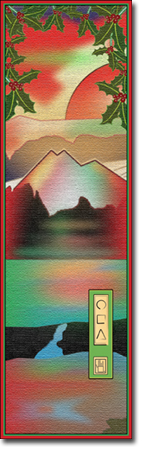On The Way: The Daily Zen Journal
Fundamental Principles
Ajahn Buddhadasa (1906-1993)
Let us investigate the fundamental principles of Dhamma, Natural Truth. I would like to discuss these essential points of Buddhism in the hope that a grasp of them will help you advance in your studies and training.
If you don’t grasp these points, you will get confused. You will feel that there are a great number of things to be known, and that they keep increasing until there are too many things to remember, understand, or practice.

This confusion is the root cause of failure; it leads to discouragement and an interest increasingly more unfocused and imprecise. In the end, it’s as if one is carrying a great load of knowledge on one’s back without being able to remember, understand, or make use of it.
Therefore, I would like to focus on the essential points of Buddhism, which are necessary for a correct understanding of Dhamma. I emphasize the fact that these points are fundamental principles, because there are some kinds of knowledge that are not fundamental, and there are some kinds that are misunderstandings deviating little by little, until they are no longer Buddhism. Or, if they are still Buddhist teachings, they are offshoots that continually branch away from the trunk.
The Quenching of Dukkha
To call something “a fundamental principle of Buddhism” is only correct if, first, it is a principle that aims at the quenching of dukkha (pain, misery, suffering) and, second, it has a logic that one can see for oneself without having to believe others. These are the important constituents of such a foundation.

The Buddha refused to deal with those things that don’t lead to the extinction of dukkha. He didn’t discuss them. Take the question of whether or not there is rebirth after death. What is reborn? How is it reborn? What is its “karmic inheritance?” These questions don’t aim at the extinction of dukkha. That being so, they are not the Buddha’s teaching, nor are they connected with it.
They don’t lie within the range of Buddhism. Also, the one who asks about such matters has no choice but to believe indiscriminately any answer that’s given, because the one who answers won’t be able to produce any proof and will just speak according to his own memory and feeling.
The listener can’t see for herself and consequently must blindly believe the other’s words. Little by little the subject strays from Dhamma until it becomes something else altogether, unconnected with the extinction of dukkha.
Now, if we don’t raise those sorts of issues, we can ask instead “Is there dukkha?” and “How can dukkha be extinguished?” The Buddha agreed to answer those questions. The listener can recognize the truth of every word of the answers without having to believe them blindly and can see their truth more and more clearly until he understands for himself.
If one understands to the extent of being able to extinguish dukkha, that is the ultimate understanding. With such understanding one knows that, even at this moment, there is no person living; one sees without doubt that there is no self or anything belonging to a self. There is just the feeling of “I” and “mine” arising due to our being deluded by the beguiling nature of sense experience.
With ultimate understanding, one knows that, because there is no one born, there is no one who dies and is reborn. Therefore, the whole question of rebirth is quite foolish and has nothing to do with Buddhism at all.
The Buddhist teachings aim to inform us that there is no person who is a self or belongs to a self. The sense of self is only the false understanding of the ignorant mind. There exists merely the natural processes of body and mind which function as mechanisms for processing, interpreting, and transforming sense data.
If these natural processes function in the wrong way, they give rise to foolishness and delusion, so that one feels that there is a self and things which belong to a self.
If the natural processes function in the correct way, those feelings don’t arise. There is the original mindfulness and wisdom, the fundamental clear knowing and true seeing that there is no “I” or “mine.”
This being so, it follows that in the sphere of the Buddhist teachings, there is no question of rebirth or reincarnation. Rather, there are the questions, “Is there dukkha?” and “How can it be quenched?” Knowing the root cause of dukkha, one will be able to extinguish it. And that root cause of dukkha is the delusion, the wrong understanding, that there is “I” and “mine.”
The matter of “I” and “mine,” ego and selfishness, is the single essential issue of Buddhism. The sense of “I” and “mine” is the one thing that must be purged completely. And it follows that in this principle lies the knowing, understanding, and practice of all the Buddha’s teachings, without exception.
Ajahn Buddhadasa (1906-1993)
Source – Heartwood of the Bodhi Tree – The Buddha’s Teaching on Voidness





What more fitting conclusion to another year’s collection of readings than a return to fundamental principles?
These are questions many practitioners also have asked when confronted with yet another initiation requiring the fulfillment of new vows. Or the thought of a complex visualization one is asked to engage in with meditation practice. With the many offshoots of Buddhism, there have appeared many new requirements, retreats, and prostrations.
Taken down to its bare bones, the aim of Buddhism is lofty enough. The extinction of a sense of “I” and “mine” is a moment-by-moment practice. The seduction of our senses and interactions with the objective world around us distract endlessly. Each person, though, has to settle with a teaching that comes closest to the fundamental purpose – the extinction of suffering.
It is always helpful to return to and remember what is the root, and what are the branches, of Buddhism.
Come, sit beneath the Bodhi tree!
Elana, Scribe for Daily Zen